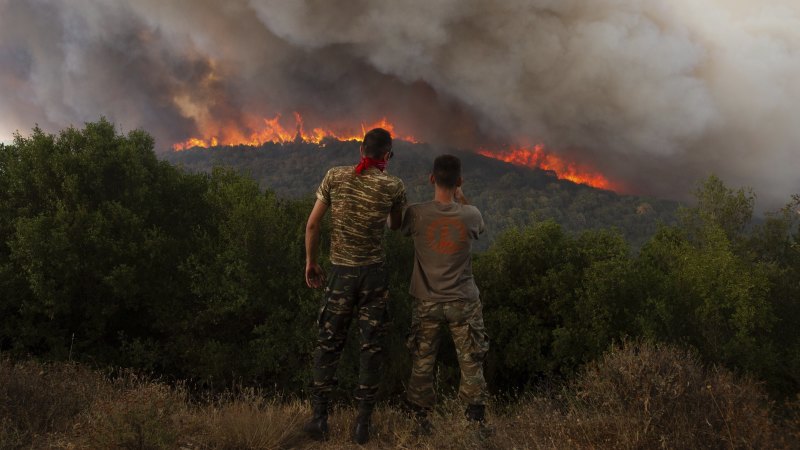Save articles for later
Add articles to your saved list and come back to them any time.
Governments worldwide are failing to cut global greenhouse emissions rapidly enough to limit global warming to 1.5 degrees and avoid catastrophic climate change and there is a rapidly narrowing window to act.
The most comprehensive stocktake of climate action made by the United Nations to date found that global emissions were not in line with the 1.5-degree temperature goals of the 2015 Paris Agreement and meeting these targets will require “phasing out all unabated fossil fuels”.
A forest fire near the village of Sykorrahi, Greece. Recent wildfires in the country have killed 20 people.Credit: AP
This finding stands in stark contrast to the actions of countries like Australia, which is still approving new coal mines and gas exploration.
The need to phase out fossil fuels has not been explicitly adopted by the UN before, but the 47-page report does not identify which countries are failing to adequately cut emissions, or what action they need to take. This report will inform negotiations at the next UN climate summit, Cop28, to be held in Dubai in November.
The global stocktake finds that the Paris Agreement has led to actions that have significantly reduced forecasts of future warming, but that the world is not on track to meet its long-term goals.
“Much more ambition in action and support is needed in implementing domestic mitigation measures and setting more ambitious targets,” it said.
The United Nations’ polite prose glosses over a truly damning report card for global climate efforts.
The findings carry significant weight, said Climate Council research director Dr Simon Bradshaw.
“It tells us we are failing – we are minutes to midnight when it comes to avoiding catastrophic climate change, and it tells us that solutions are available,” said Bradshaw. “There’s a clear message for Australia – we must phase out fossil fuels.”
Australia is now vying with Turkey to host a joint Australia-Pacific COP climate meeting in 2026. Pacific governments have been broadly supportive of the proposal, but climate groups say Australia’s continuing extraction of fossil fuels renders its bid hypocritical.
“Whether we get behind the unequivocal need to phase out fossil fuels will be the test of our ability as a COP host,” said Bradshaw.
According to the most recent reports from the Intergovernmental Panel on Climate Change, global greenhouse emissions must peak between 2020 and 2025 to limit warming in accordance to the Paris goals. Emissions have peaked in some developed and developing countries, but global emissions have not yet peaked.
Ambassador Dr Pa’olelei Luteru, the chair of the Alliance of Small Island States, said small and low-lying islands were facing an enormous crisis.
“The report confirms that the world is woefully behind on climate action to peak emissions and limit our world’s warming to 1.5 degrees – and our small island developing states will continue to pay the price for bigger countries’ inertia.”
Buildings submerged by floodwaters following Storm Daniel in rural Greece.Credit: Bloomberg
Bill Hare, the Australian-based chief executive of global Climate Analytics, said it still remained possible to limit warming to 1.5 degrees if action was taken now.
“It lays down the gauntlet for governments on the urgent action needed, including peaking emissions by 2025 before delivering rapid and deep emissions cuts over this decade and beyond, Hare said.
Access to climate finance for developing countries needs to be enhanced, the UN report finds, with climate change adaption and financial support required to reduce the increasing impacts of climate change on those least able to recover from disasters.
Ani Dasgupta, the president and CEO of the World Resources Institute, called the report a “wake-up call” and a pivotal opportunity to correct course.
“The United Nations’ polite prose glosses over what is a truly damning report card for global climate efforts. Carbon emissions? Still climbing. Rich countries’ finance commitments? Delinquent. Adaptation support? Lagging woefully behind,” said Dasgupta.
“We already knew the world is failing to meet its climate goals, but leaders now have a concrete blueprint underpinned by a mountain of evidence for how to get the job done.”
Get to the heart of what’s happening with climate change and the environment. Our fortnightly Environment newsletter brings you the news, the issues and the solutions. Sign up here.
Most Viewed in Environment
From our partners
Source: Read Full Article


